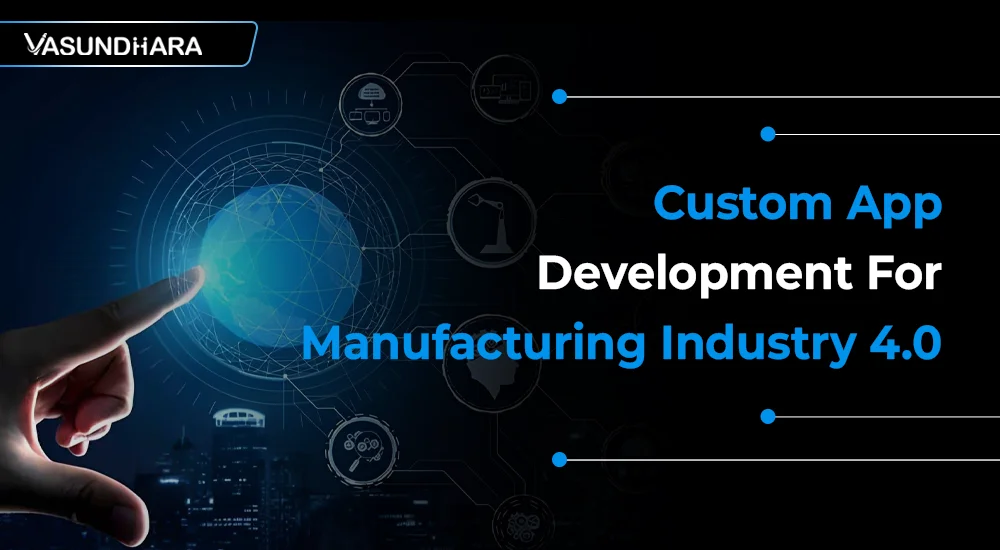The term "Industry 4.0" refers to the fourth industrial revolution, characterized by integrating advanced technologies into manufacturing processes.
This era emphasizes the use of smart technology, data exchange, and automation to create a more efficient and interconnected manufacturing environment.
Custom app development plays a pivotal role in harnessing the power of Industry 4.0 for the manufacturing sector. Tailored applications cater to the specific needs of each manufacturing unit, addressing challenges and optimizing processes.
This blog will delve into the intricacies of Industry 4.0, exploring the key features and technologies that define it. It will emphasize the role of manufacturing app development services in overcoming challenges, enhancing efficiency, and providing real-world use cases.
Understanding Industry 4.0 in Manufacturing
Industry 4.0 represents a paradigm shift in the modern manufacturing landscape, marked by the integration of cutting-edge technologies to create a more connected, intelligent, and efficient industrial environment.
This transformative era is characterized by the fusion of digital, physical, and biological systems, heralding a new age of smart manufacturing businesses.
Key Features and Technologies
- Internet of Things (IoT):
At the heart of Industry 4.0 is the Internet of Things (IoT), where devices, machines, and systems seamlessly communicate with each other. In manufacturing business, this connectivity enables real-time monitoring, data exchange, and smart decision-making.
- Artificial Intelligence (AI):
AI empowers machines to learn, adapt, and make decisions autonomously. In manufacturing, AI algorithms optimize processes, predict maintenance needs, and enhance overall operational efficiency.
The massive volume of data generated in manufacturing is harnessed through big data analytics. This enables manufacturers to derive meaningful insights, make informed decisions, and optimize their production processes.
- Cyber-Physical Systems (CPS):
CPS involves the integration of physical processes with digital systems. This synergy allows for real-time monitoring, control, and synchronization of manufacturing processes, fostering a more responsive and adaptive production environment.
Why Manufacturing Company Needs Mobile App
Custom mobile apps in manufacturing play a pivotal role in Industry 4.0 by acting as the tailored interface between these advanced technologies and the specific needs of manufacturing units.
These applications are designed to streamline processes, enhance connectivity, and address unique challenges faced by different industries.
Manufacturers can leverage custom apps to integrate IoT devices, implement AI algorithms, analyze big data, and synchronize cyber-physical systems according to their specific requirements.
This customization ensures that the implementation of Industry 4.0 technologies aligns seamlessly with the intricacies of individual manufacturing processes.
As we journey further into the Industry 4.0 era, understanding the role of these technologies and the importance of customized applications becomes paramount for manufacturers aiming to stay competitive and thrive in this new industrial revolution.
The adoption of Industry 4.0 is not just a technological upgrade; it's a strategic move towards a more efficient, agile, and connected future for manufacturing.
Challenges in Manufacturing Industry 4.0
As manufacturing embraces the transformative wave of Industry 4.0, several challenges emerge, necessitating strategic solutions for a seamless transition.
- Integration of Technologies
Challenge:
The integration of diverse Industry 4.0 technologies, such as IoT, AI, big data analytics, and CPS, poses a significant challenge.
Coordinating these technologies to work in harmony within existing infrastructures requires careful planning and execution.
Solution:
Custom apps play a crucial role in addressing this challenge by acting as a unifying interface.
They facilitate the seamless integration of various technologies, ensuring that data flows cohesively across the manufacturing ecosystem.
- Data Security and Privacy Concerns
Challenge:
With the increased connectivity and data exchange in Industry 4.0, concerns about data security and privacy become paramount.
The vast amount of sensitive information circulating within the manufacturing environment requires robust protective measures.
Solution:
Custom apps can incorporate advanced security protocols, encryption techniques, and user authentication to safeguard data integrity and protect against unauthorized access.
This proactive approach ensures a secure digital environment for manufacturing business operations.
- Skill Gaps and Workforce Training
Challenge:
The implementation of Industry 4.0 technologies demands a skilled workforce capable of managing and utilizing these advanced systems.
Skill gaps and the need for workforce training emerge as significant hurdles.
Solution:
Custom apps can contribute to overcoming this challenge by incorporating user-friendly interfaces and intuitive functionalities.
This simplifies the operators' learning curve and enhances the workforce's adaptability to new technologies, minimizing skill gaps.
- Customization Needs in Manufacturing Processes
Challenge:
Generic solutions may not align with the specific requirements of diverse manufacturing processes.
Adapting one-size-fits-all solutions to the unique nuances of each industry becomes a considerable challenge.
Solution:
Custom apps address this challenge by allowing manufacturers to tailor functionalities according to their specific processes.
This customization ensures that the technology aligns precisely with the intricacies of individual manufacturing units.
As manufacturers navigate through these challenges, the strategic deployment of custom applications emerges as a key solution.
By understanding the intricacies of Industry 4.0 challenges and proactively addressing them through tailored solutions, manufacturers can not only overcome obstacles but also unlock the full potential of this revolutionary era in manufacturing.
Advantages of Custom App Development
Custom app development offers a multitude of advantages, especially in the context of Industry 4.0 in manufacturing.
These advantages span efficiency, productivity, and adaptability to specific business needs.
- Tailoring Apps to Specific Manufacturing Processes:
Custom apps are designed to align with the nuances of individual manufacturing processes, ensuring a precise fit for the unique needs of each industry.
- Increased Efficiency and Productivity:
By streamlining operations, reducing downtime, and automating repetitive tasks, custom apps contribute to heightened efficiency and productivity levels.
- Real-time Monitoring and Analytics:
Custom apps provide real-time data, enabling manufacturers to monitor processes on the go. Analytics within the apps offer valuable insights for informed decision-making.
- Enhanced Decision-making:
The data-driven nature of custom apps equips decision-makers with the information needed to make strategic choices, ultimately leading to better outcomes.
Use Cases of Custom Apps in Manufacturing
Custom apps in manufacturing play a pivotal role in addressing specific challenges and optimizing various processes. Here are some key use cases where custom apps prove invaluable in the Industry 4.0 landscape:
Custom apps streamline supply chain operations by providing real-time visibility into the movement of raw materials, components, and finished goods. These applications integrate with various systems, enabling manufacturers to track shipments, monitor inventory levels, and optimize logistics for improved efficiency.
Custom apps leverage IoT sensors and AI algorithms to predict equipment maintenance needs.
By continuously monitoring machinery conditions, these applications can identify potential issues before they escalate, minimizing downtime and extending the lifespan of critical assets.
- Quality Control and Assurance
Incorporating custom apps into quality control processes ensures adherence to industry standards and regulations.
These applications facilitate real-time monitoring of production parameters, perform automated quality checks, and generate comprehensive reports, enhancing overall product quality.
Custom apps optimize inventory management by automating processes such as order fulfillment, stock tracking, and demand forecasting.
These applications provide accurate real-time data, preventing stockouts, minimizing excess inventory, and improving overall supply chain efficiency.
Custom apps can automate repetitive and manual tasks within manufacturing processes.
Whether it's automating data entry, controlling machinery, or managing workflows, these applications enhance efficiency by reducing human intervention and minimizing errors.
Custom apps assist in workforce management by tracking employee performance, managing schedules, and facilitating communication.
These applications can include features such as training modules, performance analytics, and safety protocols, contributing to a more organized and efficient workforce.
Best Practices in Custom App Development
Implementing custom app development for Industry 4.0 in manufacturing demands adherence to best practices to ensure the successful integration of technology and optimal performance. Here are some key best practices:
Scalability and Future-Proofing: Design custom apps with scalability in mind to accommodate future growth and technological advancements.
Ensure that the application architecture and infrastructure can easily adapt to evolving requirements and new Industry 4.0 technologies.
User-Friendly Interfaces: Prioritize the development of intuitive and user-friendly interfaces.
Custom apps should be accessible to users with varying levels of technical expertise, reducing the learning curve and encouraging widespread adoption within the workforce.
Continuous Testing and Quality Assurance: Implement rigorous testing protocols throughout the development lifecycle.
Thoroughly test the custom app for functionality, performance, and security to identify and address potential issues before deployment, ensuring a smooth and error-free user experience.
Regular Maintenance and Updates: Establish a proactive maintenance plan to address bugs, enhance performance, and ensure compatibility with evolving technologies.
Regular updates and patches keep the custom app relevant and aligned with the dynamic nature of Industry 4.0.
Agile Development Methodology: Embrace an agile development approach to promote flexibility and responsiveness to changing requirements.
Break down the development process into iterative cycles, allowing for continuous improvement and adaptation to evolving needs.
Conclusion
Custom app development is instrumental in harnessing the potential of Industry 4.0 for manufacturing.
The integration of IoT, AI, big data analytics, and CPS can be seamlessly achieved through tailored applications.
Manufacturers are encouraged to adopt custom apps to stay competitive, address challenges, and unlock the full potential of Industry 4.0 technologies.
The future of manufacturing lies in the continued evolution and integration of Industry 4.0 technologies, with custom apps playing a central role in shaping the landscape.
For manufacturers looking to embark on the Industry 4.0 journey, Vasundhara Infotech stands ready to provide tailored app development solutions as a leading custom software development company in India.
Custom app development is not just a technological investment; it's a strategic move towards a more efficient, productive, and future-ready manufacturing industry in the era of Industry 4.0. Contact us today to revolutionize your manufacturing processes.




